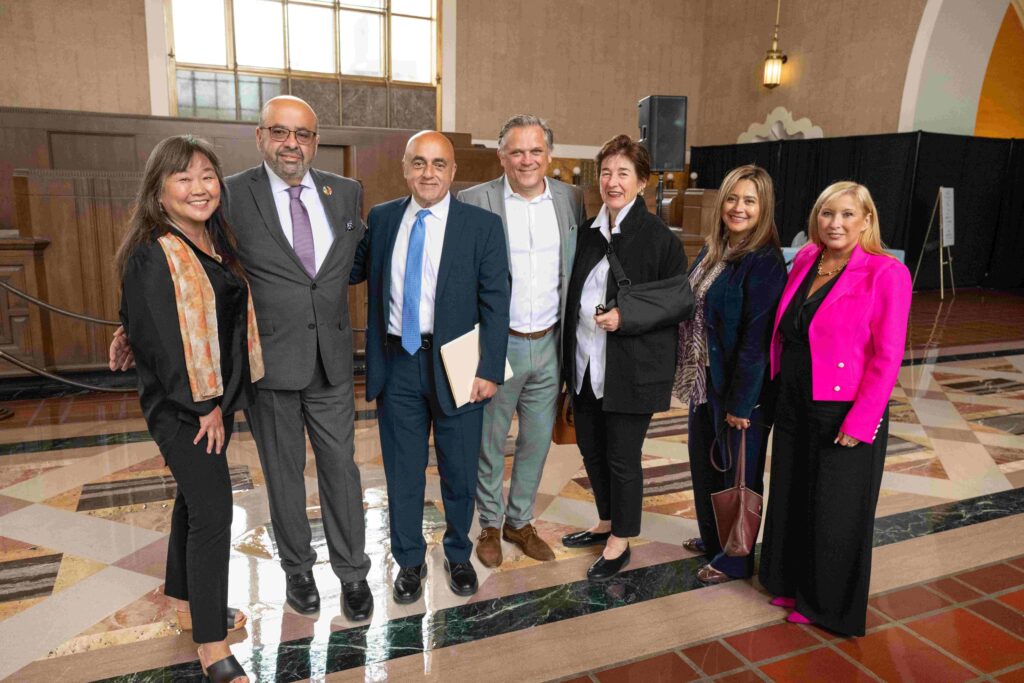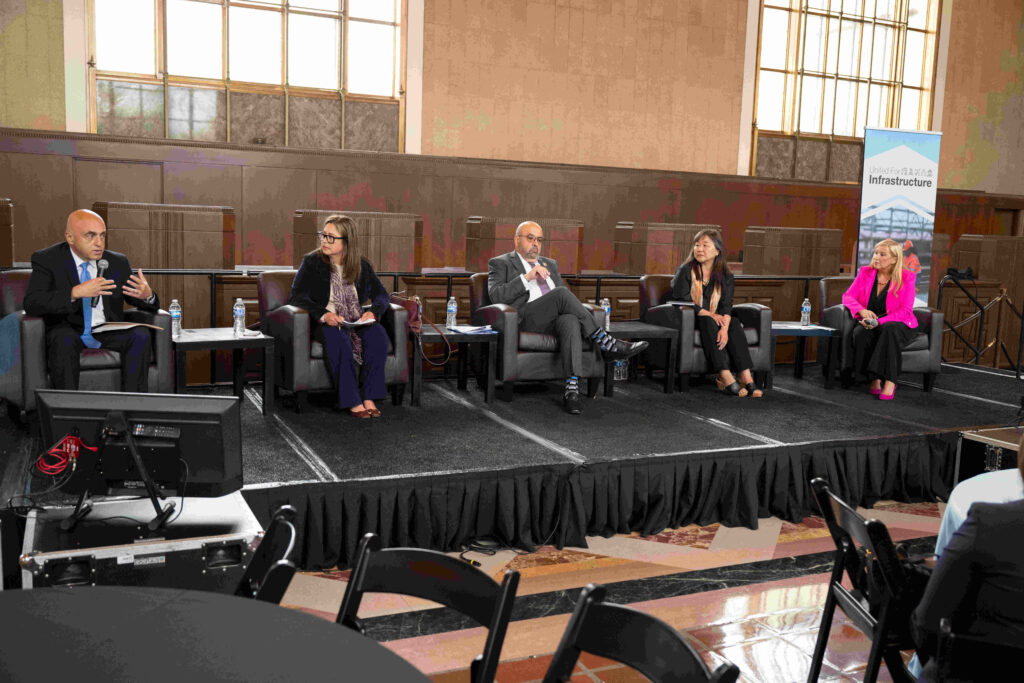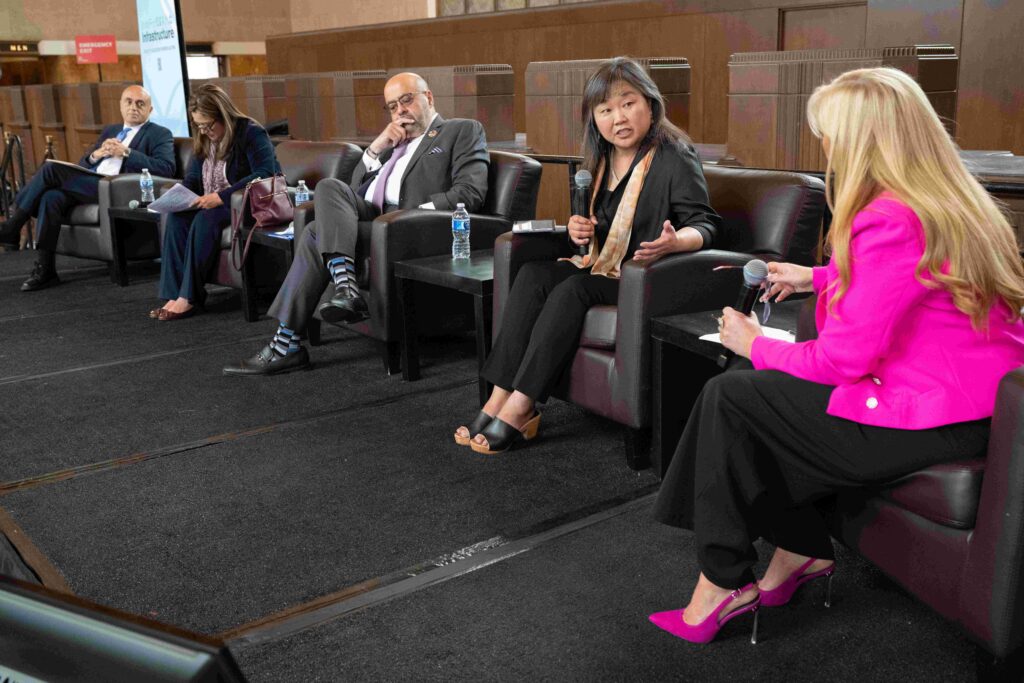United for Infrastructure panel recap: Mega projects require mega partnerships
Together with our partners, we have been part of major transformations in the city of Los Angeles for the past 100 years. As LA continues to evolve, we’ve been trusted to move the city’s infrastructure forward. Like so many other regions, it is at an inflection point in its history as it prepares to transition to clean energy, decarbonization and water resiliency.
At the 2024 United for Infrastructure West Coast Anchor Event at Los Angeles’ historic Union Station, Dr. Beverley Stinson, AECOM’s global Water business line chief executive, moderated a panel focused on the future of LA’s infrastructure amidst the growing impacts of climate change.
The panel, introduced by our LA Metro Executive & Strategy + Growth Leader Jill Kurth, featured Barbara Romero, Director and General Manager, LA Department of Sanitation & Environment, Aram Benyamin, COO, LA Department of Water and Power, Adel Hagekhalil, General Manager, Metropolitan Water District of Southern California and Mami Hara from the US Water Alliance.

Looking beyond funding
The panelists emphasized the importance of greater investment in water infrastructure in response to climate change, but also stressed the need to look beyond funding to find innovative solutions for the long term. “The US Water alliance just released a study with the American Society of Civil Engineers (ASCE), that demonstrates that even if we continue to invest in water infrastructure, at IIJA levels, for the next 20 years, we will not come close to meeting the trillions of dollars of gap in water infrastructure that have been accrued over the last 50 years,” said Mami Hara.
“We are going to have to be innovative, because of the limited resources that we have we must be very serious about renewable water resources that are sustainable. We need to think long term,” Aram Benyamin said.
The discussion also touched on the importance of continued water and power access for residents of LA. “We have been dealing with infrastructure in LA for a 100 years and we have pipes that are 140 years old still working in LA, so when you look at the decarbonization, and infrastructure renewals that we have to do, we have to make sure that the water and power for over 4 million people are sustained while we are doing that transition, “ said Aram Benyamin.

Looking to the future
The panelists agreed that substantial thought and investment will be needed to ensure the right decisions are being made, not just for today but for future generations. Adel Hagekhalil said, “What we do today is going to impact the future for our children and grandchildren. We must make a commitment to invest in resiliency.”
“We are relying on our grandparents’ infrastructure, so we have to invest and make it work to be prepared for not just a 10-year storm but a 100-year storm,” Barbara Romero shared.

Together is how we can succeed
Panelists recognized the critical need for not only a green transition but one that addresses environmental, economic and community health needs to create a regenerative economy. Mami Hara emphasized her firm belief that “funding partnerships with local community members are essential to meeting the demands of this region and others.”
Barbara Romero agreed that partnerships are essential for making good choices with the limited resources in the region: “When you do not have enough resources, you figure out how to make it work. Having those coordination efforts is going to be critical, we are at that critical point where we need to make some decisions to proceed forward.”
The issues facing the region are a collective problem requiring a collective solution across agencies and organizations. To uplift and protect communities from climate change, industry members need to collaborate and leverage their resources because this is a problem that cannot be solved alone. “You can only move at the speed of trust, and we need to build trust, trust each other, and create a new paradigm,” said Adel Hagekhalil.
As Jill Kurth shared during her panel introduction, “mega projects require mega partnerships.”
With nearly a thousand technical experts based in Los Angeles, we stand ready to partner with our clients to help transform LA’s future for the next 100 years. Click here to learn more about how our people are at the forefront of solving some of today’s most complex challenges in the region.






